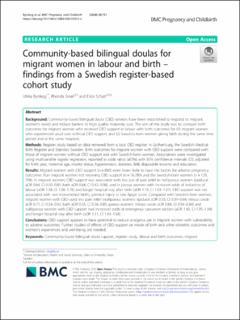| dc.identifier.citation | Byrskog, U., Small, R., & Schytt, E. (2020). Community-based bilingual doulas for migrant women in labour and birth – findings from a Swedish register-based cohort study. BMC Pregnancy and Childbirth, 20(1). | en_US |
| dc.description.abstract | Background
Community-based bilingual doula (CBD) services have been established to respond to migrant women’s needs and reduce barriers to high quality maternity care. The aim of this study was to compare birth outcomes for migrant women who received CBD support in labour with birth outcomes for (1) migrant women who experienced usual care without CBD support, and (2) Swedish-born women giving birth during the same time period and at the same hospitals.
Methods
Register study based on data retrieved from a local CBD register in Gothenburg, the Swedish Medical Birth Register and Statistics Sweden. Birth outcomes for migrant women with CBD support were compared with those of migrant women without CBD support and with Swedish-born women. Associations were investigated using multivariable logistic regression, reported as odds ratios (aORs) with 95% confidence intervals (CI), adjusted for birth year, maternal age, marital status, hypertension, diabetes, BMI, disposable income and education.
Results
Migrant women with CBD support (n = 880) were more likely to have risk factors for adverse pregnancy outcomes than migrant women not receiving CBD support (n = 16,789) and the Swedish-born women (n = 129,706). In migrant women, CBD support was associated with less use of pain relief in nulliparous women (epidural aOR 0.64, CI 0.50–0.81; bath aOR 0.64, CI 0.42–0.98), and in parous women with increased odds of induction of labour (aOR 1.38, CI 1.08–1.76) and longer hospital stay after birth (aOR 1.19, CI 1.03–1.37). CBD support was not associated with non-instrumental births, perineal injury or low Apgar score. Compared with Swedish-born women, migrant women with CBD used less pain relief (nulliparous women: epidural aOR 0.50, CI 0.39–0.64; nitrous oxide aOR 0.71, CI 0.54–0.92; bath aOR 0.55, CI 0.36–0.85; parous women: nitrous oxide aOR 0.68, CI 0.54–0.84) and nulliparous women with CBD support had increased odds of emergency caesarean section (aOR 1.43, CI 1.05–1.94) and longer hospital stay after birth (aOR 1.31, CI 1.04–1.64).
Conclusions
CBD support appears to have potential to reduce analgesia use in migrant women with vulnerability to adverse outcomes. Further studies of effects of CBD support on mode of birth and other obstetric outcomes and women’s experiences and well-being are needed. | en_US |

